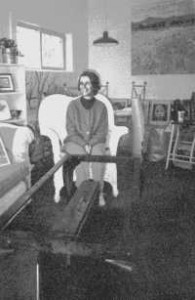Essay by John Clayton
Western Life – December 2000 – Colorado Central Magazine
“Stop waving at everyone,” said my friend visiting from California. He felt like he was in a caricature of small-town life. He figured I couldn’t really know all these people, and was just greeting them for the effect it had on him.
It was 1992. I don’t believe I was exaggerating the role, but I sure did love playing it. I’d been out West for just two years, waiting on tables between stingy free lance copyediting assignments. But I especially reveled in these visitors, who confirmed for me the benefits of the tradeoff: scenery and sense of community in my new home. I loved taking them on hidden hikes and showing them the locals’ favorite restaurants. My favorite time was the offseason, when the tourists were gone and we locals had this idyll to ourselves.
Going back to Massachusetts for weddings, I would wear a cowboy hat and string tie. When people asked if I intended to stay in Montana, I would tell them I couldn’t imagine living anywhere else. It was home, I would say — I was just accidentally born 2500 miles away.
Little did I know that I was simply activating an archetype. The feeling that I was special? The taxonomy defining those characteristics had been set long ago.
In the book Devil’s Bargains, a history of tourism in the 20th-century American West, Hal Rothman coins a term to explain this breed: the “neonative.” Rothman discusses dozens of neonatives, all over the West, dating back to the beginnings of permanent Anglo settlement.
Neonatives believe they have a unique attachment to and appreciation of place, Rothman says. They share a sense of community. They especially enjoy the offseason. They have an intense desire to claim their new residence as home and heritage. Indeed, 81 years before me, hotelier John Wagner proclaimed to his neighbors in Santa Fé that he was in fact a native who just happened to have been born elsewhere.
Most characteristically, neonatives are perceived by visitors as native but never fully integrated into the local scene. They always carry some remnant of their Eastern values, which at times conflict with native values.
Reading that, I flashed back on other memories from those early years: I didn’t feel comfortable wearing the cowboy hat in Montana — only on the East Coast. Though people were friendly and open, they never included me in hunting camps, or branding parties, or one of the old-time Norwegians’ authentic saunas. For my part, I never really liked the coffee in the locals’ favorite breakfast joint. When smoke-free restaurants opened up, and bars serving microbrew beer, I started patronizing them.
I FELT GUILTY ABOUT IT, SURE. I knew that the place I had professed to love was a smoky place with bland coffee and watery beer, and that supporting the spread of East Coast fads might change it. But I couldn’t help myself. I wasn’t truly part of the old scene, never felt fully comfortable, wasn’t truly a native.
Devil’s Bargains portrays neonatives as responsible for many of the nightmares of the West’s last 100 years. For example, by the 1920s Wagner and his contemporaries had transformed Santa Fé from a dusty multicultural backwater into a Disneyfied imitation of its former self. (Even then, tourism involved the same tradeoffs we mourn today: comfort and simplicity vs. authenticity.) Neonatives also spurred the tourist-commodification of places like the Grand Canyon and Jackson Hole.
Many of the excesses, Rothman argues, came when the neonatives forgot about the “neo.” They started acting like natives, appropriating attitudes and customs not warranted by their relationship with the place — which, though intense, was still brief and superficial.
I think of it this way: because the cowboy hat first strikes the neonative as a fashion accessory, it can never give up that role, even on the rare occasions when it actually serves to keep the sun out of his eyes.
I have made a pledge to myself and my community. I pledge to always acknowledge the “neo.” To do so is not only to realize that I lack (and crave) the formative childhood episodes and philosophies of those who were born here. It’s also to celebrate the way my life was changed by the sudden, late discovery of paradise.
The fact that others have made the exact same discovery — the fact that a historian who has never met me can so accurately describe these experiences and my reactions to them — does not diminish their importance in my life. At least, not much.
Though it is disconcerting, a bit. For example, hidden in his bibliography, Rothman also notes this about neonatives: they’re overly self-conscious about their position. Which explains why I felt the need to write this essay.
John Clayton is a contributor to Writers on the Range, a service of High Country News (www.hcn.org). He lives in Red Lodge, Montana.

